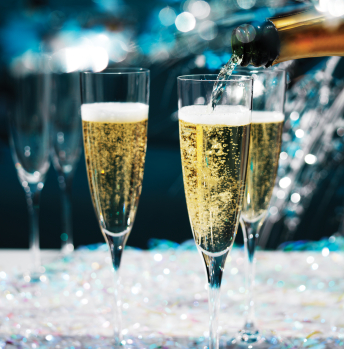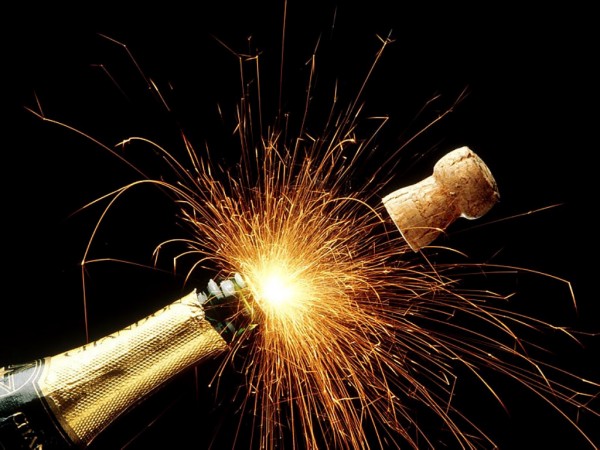Contributing Editors
ARE YOU DRINKING ENOUGH CHAMPAGNE?
Greg McCluney • 6/28/14  Print This Post
• Comment
Print This Post
• Comment

NEW RESEARCH SAYS AT LEAST THREE GLASSES OF CHAMPAGE PER WEEK CAN IMPROVE YOUR MEMORY
Introduction
The article below was written by Contributing Editor, Greg McCluney. It speaks to research that Champagne not only tastes good, but that it is good for you. And, Champagne is especially good for us older folks. So that makes it official. Forget about special occasions. For my wife and I, nearly every day is a special occasion and one of the things that makes it special is our nightly regime of starting (and sometimes ending) our evening meal with Champagne! Cheers – John Tilson
Champagne has forever fought the stigma of celebration – or some call it the New Year’s Catch 22. Some think that you need to have something to celebrate before enjoying a glass of bubbly, be it Champagne or sparking wine.
For the record, Champagne comes only from France. Other sparklers include Cava from Spain and Prosecco from Italy. Some American producers use the designation “American Champagne” for their bubbly products, but it is sparkling wine not Champagne. Only the area of Champagne can produce Champagne.
There are still some wine drinkers who think that it doesn’t seem right to drink this celebration in a bottle sans same good news. But, an increasing number of people believe that just opening a bottle of Champagne IS good news! Well, a group of scientists at Reading University, United Kingdom, have given us all the good news we need to enjoy more great wines that sparkle.
According to a biochemistry professor at Reading, anyone over 40 would do well to drink at least three glasses of Champagne each week to help prevent Alzheimer’s disease and dementia. And don’t expect to knock off your treatments soon, as the report notes that these disorders continue to accelerate well into one’s 80s. Our favorite professor goes on to point out the disease represents a gradual decline, so the earlier a person begins taking in these beneficial compounds, the better.
The anti-aging benefits come from phenolic acid, which is found in black grapes. Two of the primary grapes used to make Champagne, Pinot Noir and Pinot Meunier, are black-skinned. Mice that were fed Champagne for six weeks did remarkably better in maze tests than those unfortunate rodents that received none. In fact, there was a 200 percent increase in the valuable proteins that increase memory function. But, since Blanc de Blancs Champagne is made from only light skinned grapes (most always Chardonnay) it seems those who want to enjoy these health benefits should be sure they are drinking Champagnes made with a blend of wine grapes, including (dark skinned) Pinot Noir and Pinot Meunier. And, just for the joy of it, mix in the Blanc de Blancs Champagnes!
Next, the school hopes to test 60 senior citizens who will be required to drink Champagne for three years as they are tested for memory function. A spokesman for the Alzheimer’s Society was encouraged, but cautioned that drinkers should not start celebrating just yet (here we go gain!). “A lot more research is needed,” he said. Indeed! Any one out there who wants to volunteer?
One might ask, can’t I just drink red wine on a regular basis and get the same benefits? Maybe. But then, that takes the fun out of the celebration. And, besides, Champagne is more refreshing!


12 comments for “ARE YOU DRINKING ENOUGH CHAMPAGNE?”
One small but important historical point about Californian and other American Champagnes: the protection of the name, usage and production method of “Champagne” was agreed in the treaty of Versailles at the end of WW1. The USA never ratified it. Under the 2006 US/EU trade agreement it was agreed that there would be no new usage of the name. Those producers with a pre-2006 approved label, could continue. BTW, we are only talking wine here; Champagne Beer is not covered by the wine rules.
Thanks for the info. I just have always felt that it was best to call something a name based on where it is. Hence using Burgundy or Champagne doesn’t work for me. California should have California wine just like every other area should have its own wine. Viva la difference!
Never heard of Champagne beer except for the Miller High Life commercials. Is there really such a thing in Champagne. I don’t recall ever seeing one when I have been in Champagne. But, then again I don’t go to Champagne to drink beer. It would just keep me from drinking Champagne which I would never consider.
In Vino Veritas,
John
Good news indeed and a welcome addition to the Bordeaux red that is already in the medicine cabinet! To avoid the cost of Champagne, I can recommend Crémant, which is “Champagne” in all but name from other AOC areas, including, our home of Luxembourg, the only non-French authorised Crémeant. And, I am pleased to say, that we enjoy the Blanc de Noirs from here and Alsace and Borgogne. These can be had here for well under €10 a bottle, so the 3 glasses a week is a piece of cake, even if we’re not celebrating a birthday!!
Hi Andy,
Bordeaux in the medicine cabinet? That’s a new one on me. Is it a first growth?
Sparkling wines can be a good alternative, but for me I just stick to Champagne. If I were in Burgundy I might have more sparkling wine so I understand your position. By the way how did you hear about the Underground in Luxembourg? Do you share it with your friends. I hope so!
In Vino Veritas,
John
When I read the title of the article, my first thought was a definitive YES! We have Champagne almost every night. It`s nice to know there are some supposed health benefits in addition to the pleasure and satisfaction derived from such imbibing.
In my mind, anything we place positive energy into, it is already enhanced for our benefit; so, thanks for more positive thoughts we can add to the joy of Champagne.
Thanks Blake,
As usual you and I are on the same page!
In Vino Veritas,
John
My dad passed away last September having been hopelessly demented for a year, but still functional prior to that time. I don’t think he ever had a glass of Champagne. If one would be inclined to use this as proof positive of the Reading University premise, I must say it took 98 years of putting up with life in our imperfect world to do him in, so I shall just proceed on the premise of the pure joyfulness of partaking of the stuff, hoping that it may also make up for my suspicion that he was a much better man than I am.
BTW From what type of glass do you prefer to drink Champagne? I have concluded the most flutes don’t do justice to the complex bouquet of even a modest Champagne, and is a waste of part of what you paid for in a unique bottle. Comments?
Hi Frank,
Interesting. But, nothing works the same for everyone. I just love Champagne so I drink it. I’m happy if there are health benefits, but even if there are none, just drinking it makes me happy and I think that is worth a lot.
We still like Champagne flutes with a wide top and tapered bottom. I can smell and taste Champagne really well from these glasses and I like looking at the bubbles! Many are now using large wine glasses. Nothing wrong with that. It’s just a matter of personal preference. But, I also think that the idea of putting Champagne in a wine glass that is mostly used for still wines is a way of saying “drink Champagne with food”. If this is the case, I don’t need that prompting either because I ALWAYS have Champagne with food and have been advocating for nearly 40 years that Champagne is one of the most versatile and food friendly wines on planet earth!
In Vino Veritas,
John
One of the most elating articles I have ever read-and on my 84th birthday too!! What a perfect present.
Glad you liked it Bud. Happy Birthday. A Champagne toast to you!
In Vino Veritas.
John
How can I sign up for testing?
Sorry Paul. Can’t help you there. But, if you just drink your quota of Champagne you have nothing to worry about!
In Vino Veritas,
John